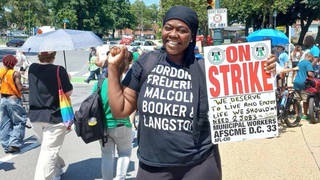
Topics
Attorney General Janet Reno said yesterday that politics should be kept out of the emotional case of six-year-old Elian Gonzalez, a Cuban shipwreck survivor who was found clinging to an inner tube after the boat he was on sank, drowning his mother and other Cuban refugees. Reno pleaded for Elian to be returned to his father in Cuba as soon as possible. [includes rush transcript]
Reno appealed for calm in the case, which has triggered angry protests in Cuba and Miami and put the boy at the center of an international tug-of-war between Cuban exiles in Miami and the government of Cuba. Several members of Congress have tried to intervene in the case to keep Elian from being sent to his father, his closest living relative, who has asked to have the boy back.
Meanwhile, members of the Haitian community held a demonstration this week to protest what they say is discrimination against Haitian immigrants, refugees and asylum seekers by the Immigration and Naturalization Service. The Haitian advocates also protested the behavior of some elected officials who lobbied for Elian Gonzalez to remain in the US while ignoring the repatriation of Haitian children.
Guests:
- Kim Ives, from the newspaper Haiti Progres.
- Severe Liviacoeur, Haitian radio broadcaster for Haiti Antennes Plus on WLQY.
Transcript
AMY GOODMAN:
We move on to an issue where people are also talking about pawns being used, and that is Elian Gonzalez. Well, Attorney General Janet Reno said yesterday that politics should be kept out of the emotional case of the Cuban six-year-old, the shipwreck survivor found clinging to an inner tube after the boat he was on sank. His mother drowned, though, as did other Cuban refugees.
Reno pleaded for Elian to be returned to his father in Cuba as soon as possible, though she did back off a bit and extended the deadline. She’s appealed for calm in the case, which has triggered angry protests in Cuba and Miami, but not only amongst the Cuban community, but also amongst the Haitian community.
A demonstration this week was held in Miami to protest what Haitians are saying is discrimination against Haitian immigrants, refugees and asylum-seekers by the INS. The Haitian advocates are protesting the behavior of some elected officials, as well, who lobbied for Elian Gonzalez to remain in the US while ignoring the repatriation of Haitian children.
We’re joined right now by Kim Ives of Haiti Progres, which is a Haitian newspaper that’s distributed both in the United States and in Haiti. And from Miami, Liviacoeur Severe, who is a Haitian radio broadcaster for Haiti Antennes Plus, a radio station in Miami, Florida.
Tell us about the protest, Liviacoeur, that you participated in this week.
LIVIACOEUR SEVERE:
Yeah, you know, since January 1st, 411 Haitian people tried to come in the United States, but, you know, due to the INS decision, they send them back to Haiti, and all the Haitian people in the community, we are very upset about that, and that’s the reason why before yesterday, Wednesday afternoon, we organized a protest, a big protest in Miami. And Saturday, tomorrow morning, tomorrow will be at 3:00 in the afternoon, we will organize another protest in downtown of Miami, because the Haitian people, they are asking for the equal treatment, and that’s why they will organize the protest Saturday again.
AMY GOODMAN:
Kim Ives, can you tell us specifically what happened in this latest ruling, the INS to reunite two Haitian children separated from their mother when their migrant-packed boat ran aground off the Florida coast? What happened?
KIM IVES:
Well, essentially the kids were sent back. The mother, in fact, had told the Coast Guard officials that she had two kids on the boat. She was sick before getting on the boat.
AMY GOODMAN:
And pregnant, as well.
KIM IVES:
And pregnant — maybe, I’m not sure about that, but she told them that she had two kids, and they proceeded to send them back to Haiti, an eight-year-old and a ten-year-old, and they got off the boat in Haiti. They expected to find their mother. She never emerged, and it turned out she was kept, among a few — a handful of other people who were too sick to send back, at Krome in Miami.
AMY GOODMAN:
Krome is the detention center.
KIM IVES:
Is the detention center. And I think that, you know, the INS had a great deal of egg on its face after that, and now there’s been talk about reuniting them, but, you know, it’s a patch-up job. I think the community has seen the hypocrisy here, where Elian Gonzalez is being held through this theatrical display, and everybody there sees it as theatrics. You know, we’re going to deport him on the 14th — yeah, right. It’s clearly giving the Cuban community their time to maneuver, do their various shenanigans with these state judges, etc., and I think the Haitian people see it really as a tremendous double standard, and I think yesterday that was in the march — funeral procession that was held in Little Haiti on Wednesday. This was brought to the fore.
I think I should also mention, at a community meeting, it was discussed, this irony between the globalization that is pushed today, where they want globalization for capital and merchandise, but the other aspect, labor, is considered to be locked down in the country where it begins. So there’s this tremendous hypocrisy in that respect.
JUAN GONZALEZ:
Well, Liviacoeur, in Miami, they would say — many of the Cubans would say the situation between Haiti and Cuba is distinct, because those who are fleeing Haiti are coming now for economic reasons, especially after the military rulers there were ousted, and those who are coming from Cuba, they insist, are coming for political reasons, fleeing a dictatorship, and they question even whether the father is voicing his own views. What’s your reaction? Do you think there is a difference in the migrations of both groups?
LIVIACOEUR SEVERE:
But, you know, the INS pretends like there is democracy in Haiti, and Cuba, this is a Communist island country, and this is the reason why, basically, they can take that decision. But we know in Haiti there is — there are a lot of problems, security problems, and the people, they are really in a bad situation. That’s why they try to go somewhere to find a better life. But we do not have, really, a problem with the Cuban people. Only what we ask, we ask for the equal treatment, and that’s why — and we are looking for — we are asking for the due process, so they can treat the Cuban people a certain ways, and us, they not even care about us. That’s why the Haitian community, they — as I told you before, they really — they are upset about that.
KIM IVES:
I would add to what Severe has to say that Cubans throughout the Caribbean, too, particularly in the Bahamas and Dominican Republic, are also being expelled. This is, we can say —
AMY GOODMAN:
Cubans?
KIM IVES:
The Haitians are one of the principal workforces throughout the Caribbean. In Dominican Republic, they cut the cane, they mix the cement. They are the principal proletariat in the Dominican Republic, as well as in the Bahamas, where they’re also being expelled.
AMY GOODMAN:
Well, I want to thank you both for that quick hit, explaining the anger of the Haitian community right now in Miami that has been protesting this week and plans another protest for tomorrow. Our guests have been Kim Ives of Haiti Progres and Liviacoeur Severe, a Haitian radio broadcaster for Haiti Antennes Plus in Miami, Florida.













Media Options